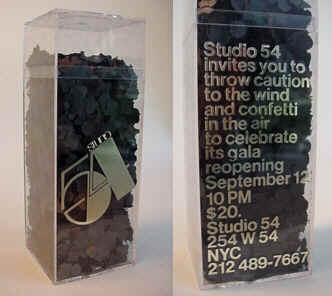
By: Brielle Stonaker





In the early 70's Steve and Ian opened up a small chain of steakhouses. One of these restaurant was the Enchanted Garden. Steve wanted to move on to bigger things like the night club that were bring in tons of money and wanted his name to be well known. They had Carmen D' Alessio the party planner they had worked with at the Enchanted Garden help them. Steve and Carmen created a buzz by going to other clubs and using Carmen's exclusive mailing list from Interview, a magazine in the 70's, and the Ford modeling agency. They went looking for clubs in the winter of 1976 and after only one week they rented a portion of 254 W. 54th St. And started renovating it.
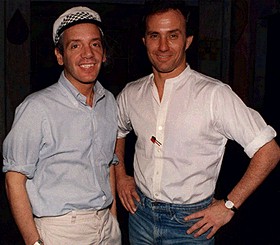 Steve and Ian
Steve and Ian

| On
April 26, 1977 the doors opened. One by one people started lining
up. Even though the doors opened an half an hour late people still
anticipated the opening of Studio 54. Over 4,000 people showed up,
but a little over 2,000 people were let in. The celebrity guest list
included - Cher, Diana Ross, Liza Minnelli, Halston, Calvin Klein, Elton
John, Andy Warhol, Christopher Reeves, Michael Jackson, Brooke Shields,
newly weds Donald and Ivana Trump, Truman Capote, Margaux Hemingway,
Richard Gere, and Yankee superstar Reggie Jackson.
HALSTON Inside the club was huge spanning 100meters long and 80 meters wide. With a balcony with 500 seats and many tables. 5,400 sq. feet on dancing floor. And with VIP basement, this club was trippen. If you needed a refreshment you could go to the diamond shaped bar with mirrors on the counter with drinks $2.50 a piece.
The special effects were spectacular. It had 500 special lighting and scenery effects, 11,000 flashing lights, red and yellow lights cascading down on 16 moving poles. The music was pounding nonstop. The first song ever played in Studio 54 was "Devils Gun" by C.J. and Co. Studio 54 had two resident DJ's - Richie Kaczor and pioneer DJ Nicky Siano. Richie played the first night and on weekends, while Nicky played on the second night and week days because he owned his own club The Gallery. But the funny thing is that Studio was so famous but nobody really ever knew who the resident DJ's. But they knew DJ's like Larry Levan from the Paridise Garage.
Drugs and sex were a common thing in the club. The most famous thing in the club besides the velvet ropes was the "Moon and the Spoon". A silver man would drop out from the moon and then a spoon full of coke would go up his nose. Just after one year the club was proclaimed "the worlds top celebrity disco". After one year the club made over $7 million.
|
|
|


"Towards midnight, people would get embarrassingly desperate if I wouldn't let them in, I think I cause more than one nervous breakdowns and more than a few broken romances." - Steve Rubell
 Studio 54's dance floor
Studio 54's dance floor
Steve Rubell was dubbed "Mr. Outside" by people who visited the club regularly. Steve, Mark Beneke, Bobby Sheridan, and Roger Parenti handled the door policy. Steve would stand outside and look for to add "the perfect mix of salad" and got rid of the "gray people". Rubell's definition of a disco person was "fun people, beautiful people". He wanted the club to be like no other, not another East Side singles bar.
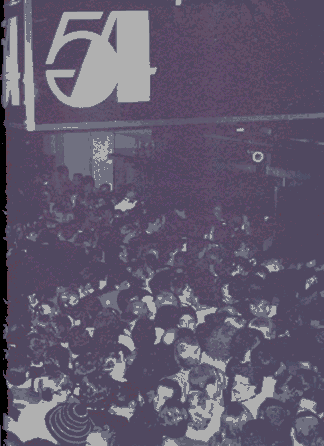
The waiting line outside
Even if you were famous your celebrity status wouldn't get you in. One ordeal was with Cher. They wouldn't let her in and she said," But I'm Cher!" and he said " I know!" But other time it had to do with what you were wearing. Another one was when Steve didn't like a shirt a guy was wearing. So he asked if he took it off could he go in. Steve shook his head so the guy went in with out a shirt on.
Nile Rodgers and Bernard Edwards of Chic was offered a recording deal to work with Grace Jones on her next album, she invited them to Studio 54 for her gig. But the doorman couldn't find their name on the list. So they went home and in 25-30 minutes they wrote their biggest hit called " Le Freak".




Rubell liked to pamper the stars
so they would keep coming to the club. Rubell Didn't know what to
get Andy Warhol for his birthday so he got trash cans and filled it with
money. He said that was the best present he ever got. At
Bianca Jaggers birthday at the finally she rode a top the stage on a white
stallion with two naked guys leading her. At Elton John's the
club was filled with Baby Grand pianos. 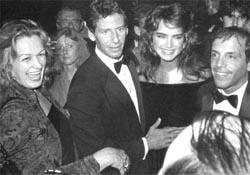 Celebrities
Celebrities


In December of 1979 one year after the first bust 50 IRS agents busted the owners and the club. They were accused of cocaine distribution and with holding taxes. They found money lying everywhere and hidden in panels and cooked books with money figures in them. Both owners were sentenced to 3 1/2 years and fined $20,000 each for tax evasion. But they only served 13 1/2 months. They spent the night before they went off to jail at a bash at the club that lasted until 7a.m. Some say it unofficially marked the end of an era. During the rest of their probation time they spent at an halfway house with a curfew of 11 p.m.
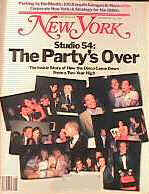 New York's mag cover after the IRS bust
New York's mag cover after the IRS bust


|
|
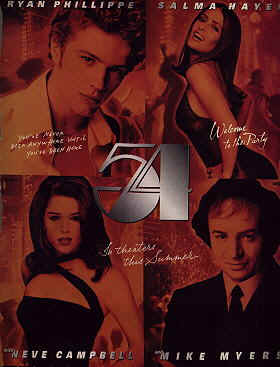




" I had the most important job in the city, and people wanted to kill me for it. I couldn't walk the streets because guys would roll down their windows and shout abuse at me for not letting them in. Either that or they'd try to bribe me with money, drugs, sometimes even their girlfriends. But I never buckled. How could I? My reputation depended on it." - Steve Rubell
In memory of Steve Rubell


8th American History
Rossville Jr. High
Post-World War II America Project
May 2002
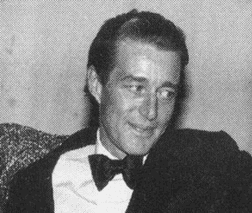

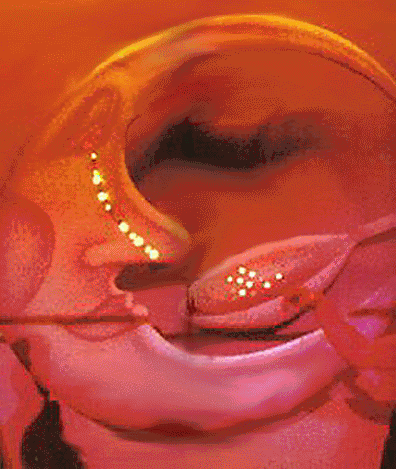 Moon and the Spoon
Moon and the Spoon